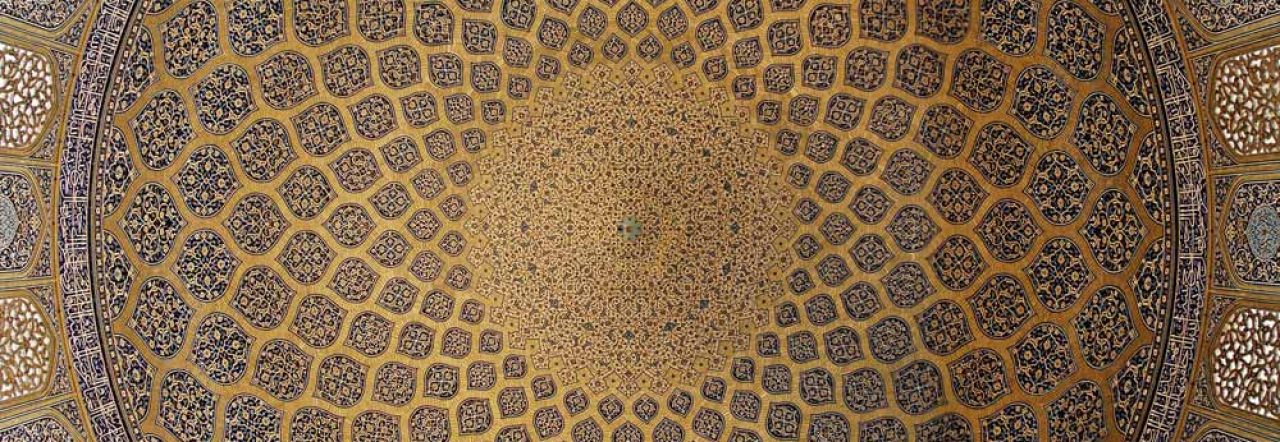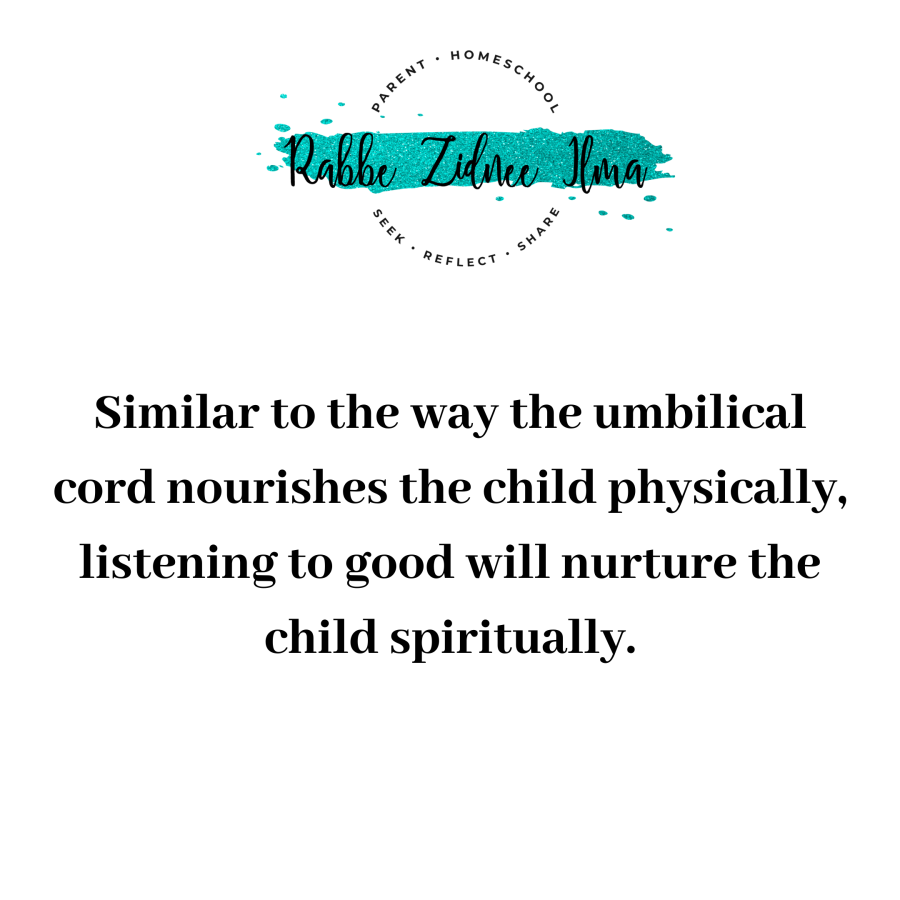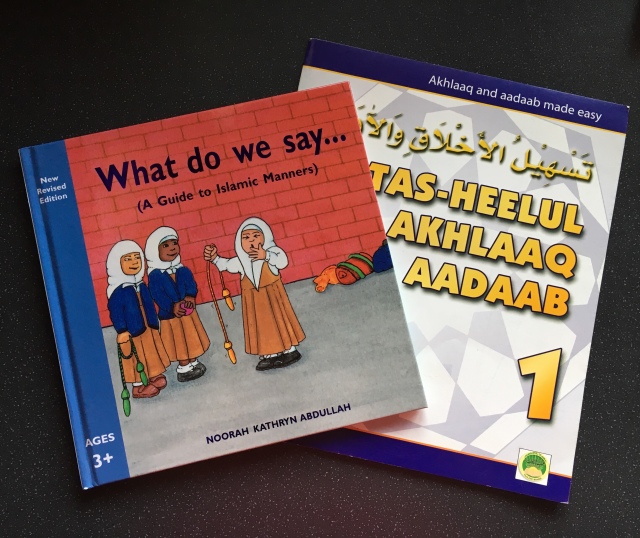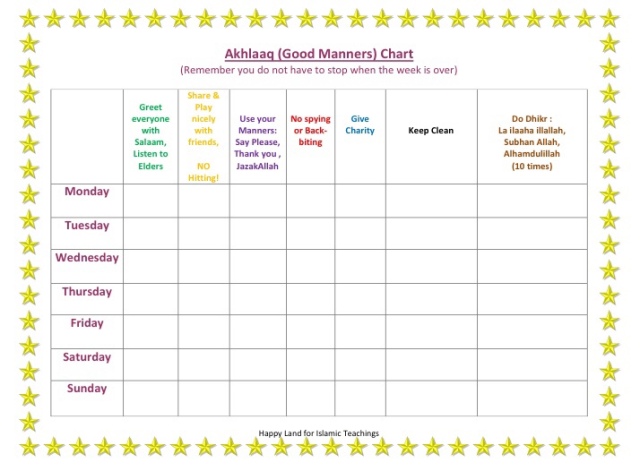Knowledge is not sought simply for intrinsic merit but has a higher primary purpose which is to achieve right guidance. Aqidah (creed) is the Arabic word for a set of religious beliefs; the ultimate aim of which is to seek closeness to Allah by way of iman (faith). Iman is essentially a matter of the heart whilst the intellect is an instrument which can be employed to clarify, explain, defend and strengthen faith. However, the locus of faith and certitude are both embedded deep within the heart and thus the stages and levels of iman directly relate to the condition of the heart.

In the early years, children should be pointed to religious beliefs as realities which are accepted. They should be taught about the: (i) Majesty and Greatness of Allah so that they are in awe of Him, (ii) Mercy Of Allah so that they love Him and that (iii) everything comes from Allah so that they are thankful. In addition to this they should be introduced to the Prophet Muhammad ﷺ so that they learn to love him and perceive him as a role model in actuality. These are all pre-cursors of belief which should be instilled before formal education begins as a preparation for the child. Especially with the current climate and context that we live in as many of these meanings may not arise naturally. Conversely, children may be exposed to views from the Christian and pagan religious traditions which may creep in and become embedded through their normal interactions with their environment.
Parents are the first people to teach a child Aqidah and ‘the one who does not have something cannot give it.’ Therefore it is imperative that as a responsible adult, parents know the core beliefs and engage in regular acts of worship, in terms of knowledge and spirituality respectively. This is significant in two ways. Firstly, children naturally follow in the footsteps of their parents and if prayer, reciting Quran and dhikr are an observed normality then it is very likely that they will become an actuality in relation to the child’s personality. Secondly, the blessing of having a child may be a reminder of the deficiencies within one self and hence allow reflection and self-improvement. Parents who are able to do this successfully will be able to raise children wherever they may find themselves in the world and during difficult times they will be able to turn to Allah completely and wholeheartedly for help.

The Imam identifies and explains three stages which are a gradual progression of one another in terms of faith and and take the child from being a small seed to a large tree with deep roots and high branches. The first stage is memorisation (Hifz) where the child should be encouraged to memorise the descriptions of the religious beliefs and this can be done in the early years, before the age of seven. This is followed by understanding (fahm) where parts of faith are gradually uncovered and the meanings are revealed as the child grows.
In order to strengthen and affirm faith it is necessary that they be introduced to regular acts of worship, recitation of the Quran and study of its commentary alongside study of the Hadith. Ultimately this combination of devotional knowledge and spiritual application will lead to acceptance (ithiqaad) and certitude (yaqeen) of faith to a point where it will be like an unshakeable deeply-rooted tree bearing lots of fruits in its high branches.
Stage One – Memorisation
In the first stage (0-7 years) children are like sponges and will absorb all the information that you present them with. As a result it is imperative to introduce them to the descriptions of the religious beliefs until they become ingrained in their memory. At this point a child does not require proofs for the existence of God. The reason being that the default position of the human heart is that it is created in a way where it is susceptible to belief without evidence and is based on taqleed (following) simple instructions.
“Anybody who believes through mere following, their faith will not be free from creeping doubts.” Imam Al-Laqqani
However, Imam Ghazali does point out that where faith is based on mere following then it will have a level of weakness. In these instances one can accept removal of faith by its opposite and even be subject to a change of faith as it has not been nurtured sufficiently. This is even more so relevant in the turbulent times that we live in where our faith is constantly challenged by the religious traditions around us, the rise of atheism and scientific theories such as evolution.
Therefore it is critical that we build on this stage and strengthen it further by performing spiritual works and nurturing the meanings of faith until it becomes solid. One of the types of worship which is suitable and relevant for this phase is the remembrance of Allah by dhikr such as ‘SubhanAllah’ and ‘Alhamdulillah’. Another is memorisation and repetition of daily duas including the sleeping and waking, before and after eating and entering and leaving the toilet.
Although children may not recognise and comprehend the meanings of these supplications fully at this point the effect of reciting them daily is profound, causing them to become deeply rooted in the child and the meanings can be nurtured further once they reach the age of understanding. The importance of this stage is that the child becomes familiar with and begins to love Allah and is immersed in His remembrance so much that it becomes a natural, normal part of life and thus easier to continue in future.
Stage Two – Understanding
Once the child reaches the age of 7-8 years, formal education begins and the meanings related to the memorised exposition of the creed can be gradually uncovered and revealed in incremental, age appropriate steps. This is done by balancing the components of worship and devotional knowledge as they are equally important. The Quran gives a beautiful metaphor in Surah Ibrahim, to describe this process:
“Have you not considered how Allah presents an example, making a good word like a good tree, whose root is firmly fixed and its branches high in the sky?” (Quran 14:24)
Where the first stage of faith was about placing and planting the seed of “La ilaha ilalah” (There in no God but Allah) in the chest of the child, it now needs to be consistently nursed, nurtured and cultivated with water, nutrients, sufficient light and air, in a gradual manner so that both the tree and child can bloom until completion and perfection. This requires a carefully balanced approach in both the methods and composition of cultivation accompanied with hard work to ensure success. In this way the tree will become deeply-rooted, firmly planted, resisting external pressures and with branches stretching loftily into the sky. Similiarly a child who has been nurtured correctly will have iman deeply rooted in the soil of the heart without being shaken by confusions; bearing an abundance of fruits in the branches of faith, by Allah’s bounty.
One of the major problems of current times is that people are discussing faith but not living by it as a reality and often it is not evident in their actions. Imam Al-Laqqani comments: ” The way to strengthen belief and make it firm is not by teaching the child the art of debate and kalam (scholastic theology). Rather one busies oneself with the Quran and it’s tafsir and exegesis and the Hadith and their meanings.” This summarises how a child should be raised within the second and further stages – with devotion and a strong connection to the Quran and Prophetic guidance. The spiritual and emotional needs of the child should be met by establishing a health, loving, caring relationship and environment so that they can be slowly guided towards practising the outward rituals of the faith.
Imam Al-Laqqani further went on to say, “The chosen position is that faith does increase with all that increases a person’s state of obedience.” This encompasses Quran recitation and study, regular routines of worship in the form of Salah and adhkaar. It also ties in with Prophetic advice of Muhammad ﷺ who advised reciting the Quran in a month. Such spiritual works will slowly nurture the meanings of iman as studying and understanding the Quran and Hadith is essentially mentioning Allah and his attributes. In this way the child will form a relationship with the Creator by getting to know Him and being conscious of His presence. Duas and dhikr have the same effect as they are in fact statements of faith which can now be understood with their meanings and when uttered constantly allow the child to reflect on Allah throughout their day from the moment of waking until the moment of sleeping.

Allah commands us to to seek out the people of truth and surround ourselves with them. “O you who have believed, fear Allah and be with those who are true.” (Quran 9:119) Introducing a child and making them accustomed to seeing, hearing and sitting with righteous people will undoubtedly have a profound impact on their faith, character and behaviour. Alongside the light which shines from the acts and routines of worship there is a light which shines from the people of righteousness in their appearance, countenance, mannerisms, humility, modesty and awe. Much can be derived in lessons from them in regards to belief, awe, love and reverence of Allah. It is therefore vital that parents contemplate deeply to identify who is true and direct their children to the company of these people so that they can be with them as their states alone will express meanings of faith that will be powerful.
It also recommended to protect the ears of the child from argumentation and debates relating to faith during this stage and for as long as possible, as the confusion caused by such things is far greater than what they may clarify, thus sowing the seeds of doubt. This was relevant to the time of Imam Ghazali due to the rise in theology and debates and it is similarly relevant today in the form of indirect challenges to faith faced by children of school age in science and other subjects and more so for students in further education. In addition to this interfaith and secetarian debates attract the masses but if one does not have firm foundational faith then these discourses can corrupt more than they rectify in matters relating to faith so one should guard their faith carefully when approaching them and avoid them in children completely.
As a result we should ensure that we have established, clarified and affirmed our foundational knowledge on what is necessary to believe in so that we may protect and preserve our faith. This is an individual obligation on a personal level but also a collective obligation on a communal level to safeguard, nurture and preserve faith within the community. Sound advice is that we should not entertain any such talk relating to our beliefs as self-doubt is common place and one may not have the rigour to pursue and understand the questions that arise in the mind. In an age of technology it is even more important to check that we are receiving correct guidance by checking our sources thoroughly and carefully selecting who we follow.
Stage Three – Acceptance & Certitude
If the child is raised upon the outlined beliefs in the early years and grows up seeking a livelihood in the world with these firm in their heart then they are considered to be on the truth and that is sufficient for them and they will be safe in the Hereafter. In the case of a common person , no further matters of creed need to be opened up to them as they are not responsible for anything more than firm conviction, as is the case of the Bedouins at the time of the Prophet Muhammad ﷺ who were on the path of belief and practise. These are the people of the right as described by Allah in Surah Waqiah of the Quran. They will be blessed with paradise and given their records in their right hand. However if you want to go above and beyond that and be counted amongst the foremost and exalted class of ‘muqarrabun’ i.e. those have drawn closest to Allah then you will need to tread the path of the hereafter by perfecting your Aqidah and purifying your heart through spirituality. This is described as the most precious jewel that is the extent of the faith by experiencing the realisation of being with Allah.
“And you will all be separated into three separate groups. So those on the Right Hand, Who will be those on the Right Hand? And those on the Left Hand, Who will be those on the Left Hand? And those foremost will be foremost in Paradise. These will be those nearest to Allah. In the Gardens of delight.” (Quran 67:7-12)
The ones at the foremost are those who are strongest in their faith and practise of righteous deeds in the life of this world. They are God-conscious, keeping themselves busy with spiritual discipline and striving and for them Allah will open doors of guidance to the realities of Aqidah with a divine light that will be placed in their hearts as a fulfilment of His true promise. “And those who strive for Us – We will surely guide them to Our ways. And indeed, Allah is with the people of excellence.” (Quran 29:69)
An indication of such acceptance and certitude in faith is given in the example of Abu Bakr (RA) and what was mentioned about the secret in his heart. It was mass transmitted that after the Prophet Muhammad ﷺ, he is the best of creation. “Abu Bakr is not better than you because of praying or fasting more, but because of something that has firmly settled in his heart.” (Tirmidhi) He was granted this pre-eminence over the rest of the companions due to his absolute conviction in and perfection of his faith. The unveiling of the secret mentioned is hidden from most people and has many degrees which are proportional to the level of an individuals spiritual striving, inward purity from all besides Allah and the search for illumination by the lights of certitude.
The Hadith Qudsi mentioned in Bukhari summarises this relationship between Allah and his devoted servants beautifully. Allah states that the most beloved acts of worship are those which have been made incumbent upon a person such as fardh Salah, fasting in Ramadhan and giving Zakah and these take precedence. Once these are established and sound a servant can draw even closer to Allah by voluntary acts of worship such as nafl prayers, Sunnah fasts and sadaqah leading to Allah’s love. At this point Allah’s love becomes manifest such that the servant does not hear, see or take action, whether by hand or foot except that it is Allah that is directing his choices towards good. Thus his supplications will be answered and he will be under Allah’s protection. May Allah make us amongst his chosen servants. Ameen.
“Allah (mighty and sublime be He) said: Whosoever shows enmity to someone devoted to Me, I shall be at war with him. My servant draws not near to Me with anything more loved by Me than the religious duties I have enjoined upon him, and My servant continues to draw near to Me with supererogatory works so that I shall love him. When I love him I am his hearing with which he hears, his seeing with which he sees, his hand with which he strikes and his foot with which he walks. Were he to ask something of Me, I would surely give it to him, and were he to ask Me for refuge, I would surely grant him it. I do not hesitate about anything as much as I hesitate about seizing the soul of My faithful servant: he hates death and I hate hurting him.” (Bukhari)
And Allah knows best. Finally – Any good within this post is from Allah the Most High and any mistakes are from myself. May He forgive and accept it from me. May he have mercy on the esteemed Imam Ghazali (rahimullah) for his service to the religion. Ameen.
<a href=”http://Al-Ghazali: the Book of Belief: Book 2. the Revival of Religious Studies (Fons Vitae Al-Ghazali) (The Fons Vitae al-Ghazali Series) “>Content inspired from Al-Ghazali: the Book of Belief: Book 2. Available here.*
“>Content inspired from Al-Ghazali: the Book of Belief: Book 2. Available here.*
*affiliate link
























 In conclusion, as parents we need to recognise that we have been entrusted with the great responsibility of nurturing and guiding our children to fulfil their primary goal of knowing and obeying Allah. We should remember that in doing so both their good and bad deeds will be attributed to us and we will have a share in them. Therefore we should take this matter very seriously. May Allah make it an easy affair for us. Ameen.
In conclusion, as parents we need to recognise that we have been entrusted with the great responsibility of nurturing and guiding our children to fulfil their primary goal of knowing and obeying Allah. We should remember that in doing so both their good and bad deeds will be attributed to us and we will have a share in them. Therefore we should take this matter very seriously. May Allah make it an easy affair for us. Ameen.